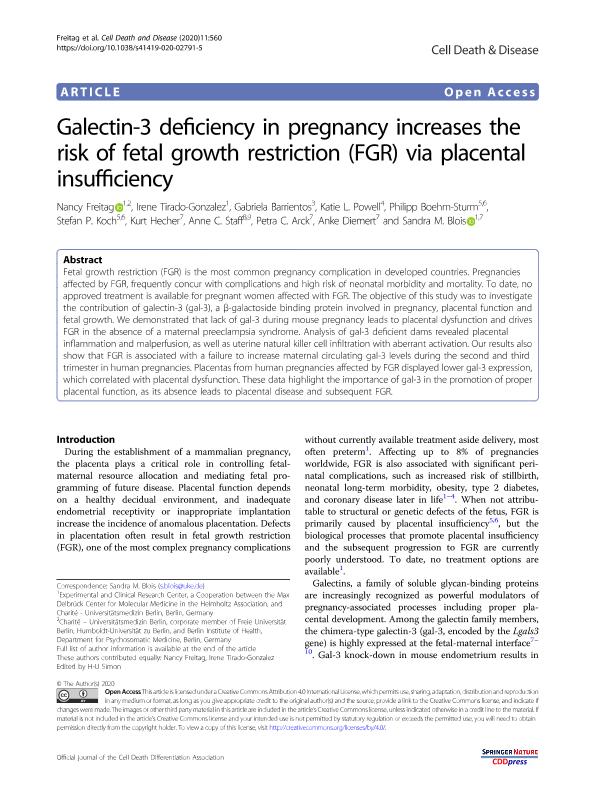Artículo
Galectin-3 deficiency in pregnancy increases the risk of fetal growth restriction (FGR) via placental insufficiency
Freitag, Nancy; Tirado González, Irene; Barrientos, Gabriela Laura ; Powell, Katie L.; Boehm Sturm, Philipp; Koch, Stefan P.; Hecher, Kurt; Staff, Anne C.; Arck, Petra Clara; Diemert, Anke; Blois, Sandra M.
; Powell, Katie L.; Boehm Sturm, Philipp; Koch, Stefan P.; Hecher, Kurt; Staff, Anne C.; Arck, Petra Clara; Diemert, Anke; Blois, Sandra M.
 ; Powell, Katie L.; Boehm Sturm, Philipp; Koch, Stefan P.; Hecher, Kurt; Staff, Anne C.; Arck, Petra Clara; Diemert, Anke; Blois, Sandra M.
; Powell, Katie L.; Boehm Sturm, Philipp; Koch, Stefan P.; Hecher, Kurt; Staff, Anne C.; Arck, Petra Clara; Diemert, Anke; Blois, Sandra M.
Fecha de publicación:
07/2020
Editorial:
Nature Publishing Group
Revista:
Cell Death and Disease
e-ISSN:
2041-4889
Idioma:
Inglés
Tipo de recurso:
Artículo publicado
Clasificación temática:
Resumen
Fetal growth restriction (FGR) is the most common pregnancy complication in developed countries. Pregnancies affected by FGR, frequently concur with complications and high risk of neonatal morbidity and mortality. To date, no approved treatment is available for pregnant women affected with FGR. The objective of this study was to investigate the contribution of galectin-3 (gal-3), a β-galactoside binding protein involved in pregnancy, placental function and fetal growth. We demonstrated that lack of gal-3 during mouse pregnancy leads to placental dysfunction and drives FGR in the absence of a maternal preeclampsia syndrome. Analysis of gal-3 deficient dams revealed placental inflammation and malperfusion, as well as uterine natural killer cell infiltration with aberrant activation. Our results also show that FGR is associated with a failure to increase maternal circulating gal-3 levels during the second and third trimester in human pregnancies. Placentas from human pregnancies affected by FGR displayed lower gal-3 expression, which correlated with placental dysfunction. These data highlight the importance of gal-3 in the promotion of proper placental function, as its absence leads to placental disease and subsequent FGR.
Palabras clave:
ENDOCRINE REPRODUCTIVE DISORDERS
,
REPRODUCTIVE DISORDERS
Archivos asociados
Licencia
Identificadores
Colecciones
Articulos(SEDE CENTRAL)
Articulos de SEDE CENTRAL
Articulos de SEDE CENTRAL
Citación
Freitag, Nancy; Tirado González, Irene; Barrientos, Gabriela Laura; Powell, Katie L.; Boehm Sturm, Philipp; et al.; Galectin-3 deficiency in pregnancy increases the risk of fetal growth restriction (FGR) via placental insufficiency; Nature Publishing Group; Cell Death and Disease; 11; 7; 7-2020; 1-9
Compartir
Altmétricas



